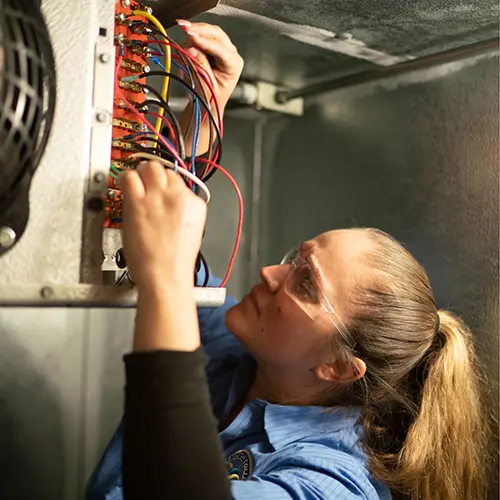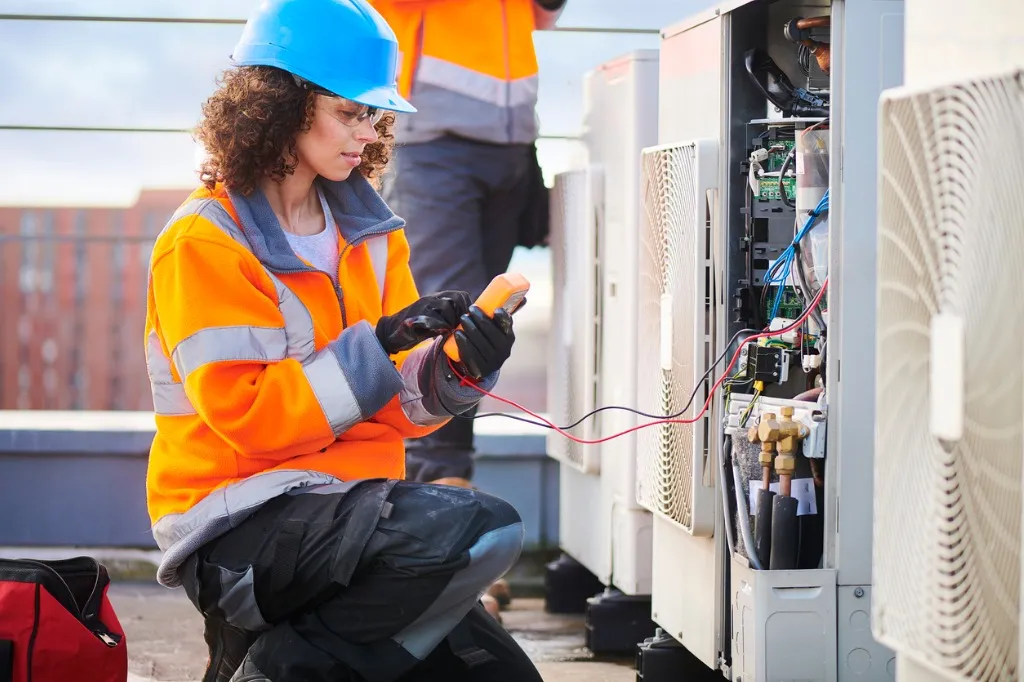Residential Heating and Air Conditioning Solutions for Year-Round Convenience
Wiki Article
An In-Depth Consider A/c Services and Their Influence On Power Performance and Cost Cost Savings
With technical advancements like smart thermostats and high-efficiency components, the possibility for enhancing system performance is vast. As we check out the elaborate connection in between Heating and cooling systems and functional prices, including the change towards environmentally friendly choices, the inquiry occurs: how can these strategies be efficiently applied to optimize both ecological and economic benefits?
Relevance of A/c Equipments
cooling and heating systems are a vital component of modern structures, playing a critical function in preserving comfortable and healthy interior atmospheres. These systems, encompassing heating, air, and air flow conditioning, are essential for managing temperature, moisture, and air high quality, thus ensuring the health of residents. Reliable cooling and heating systems contribute significantly to creating an optimal indoor environment, which is essential for both commercial and property spaces.In business buildings, a/c systems are essential to giving a safe and effective environment. By regulating indoor environment conditions, these systems assist protect against the growth of mold and the spread of air-borne impurities, thus securing the health of employees and consumers. In addition, in residential setups, a/c systems improve living conditions by using constant thermal comfort and improving interior air quality, which is crucial for total health.
Additionally, the layout and maintenance of heating and cooling systems have a straight influence on energy usage and functional prices. Correctly created and kept systems can considerably lower power use, bring about reduced energy costs and a smaller sized carbon footprint. The efficiency of these systems thus plays an important duty in advertising sustainability and power conservation within buildings, highlighting their significance in the contemporary architectural landscape.
Advancements in Heating And Cooling Innovation
Technology in HVAC technology is revolutionizing the way buildings manage indoor climates, introducing a brand-new era of performance and control. Current innovations have actually concentrated on enhancing energy usage while enhancing individual convenience. One noteworthy development is the assimilation of smart thermostats, which utilize expert system to discover occupancy patterns and adjust temperature levels appropriately, decreasing unneeded power use.Variable Cooling Agent Circulation (VRF) systems represent another substantial leap onward. These systems permit exact temperature level control in different areas of a building, boosting comfort and reducing power waste. VRF technology is specifically advantageous for huge industrial rooms, using versatility and scalability.
Additionally, the development of Internet of Points (IoT) tools has changed heating and cooling systems into interconnected networks with the ability of real-time information collection and analysis. This connection makes it possible for predictive upkeep, guaranteeing systems run at peak efficiency and lessening unexpected downtime.
Moreover, developments in products and design, such as the usage of high-efficiency coils and compressors, have enhanced total system performance - Heating Contractor. The fostering of ecologically pleasant refrigerants likewise emphasizes the industry's commitment to sustainability
These technological technologies are critical in minimizing functional prices and environmental effect, establishing brand-new criteria for building climate administration.
Cooling And Heating Maintenance and Effectiveness
Making sure optimal efficiency of cooling and heating systems extends beyond technological improvements; it also hinges on efficient maintenance methods. Normal upkeep is important for maintaining performance, lowering energy consumption, and extending the see this life expectancy of a/c systems. The main objective is to make sure that all parts operate at their peak possibility, therefore reducing energy wastage and keeping regular interior convenience degrees.Routine upkeep jobs, such as cleansing or changing air filters, checking cooling agent levels, and inspecting ductwork for leaks, are crucial for avoiding unnecessary pressure on the system. Unclean or clogged up filters can obstruct airflow, causing the system to navigate to this website function more challenging and take in more energy. Furthermore, poor cooling agent levels can reduce cooling down performance, leading to greater functional costs.
Additionally, routine inspections by certified specialists can determine potential concerns before they escalate right into costly fixings or system failings. These inspections often consist of inspecting electrical links, calibrating thermostats, and making certain the general integrity of the HVAC system. By resolving minor problems early, companies and homeowners can stay clear of unforeseen failures and improve power effectiveness.
Cost-Effective Heating And Cooling Solutions
For those seeking to obtain the most out of their heating, air, and ventilation conditioning systems without damaging the bank, checking out cost-efficient heating and cooling remedies can make a significant distinction. One prompt measure is to spend in programmable thermostats, which permit users to set details temperatures for different times of the day, enhancing power usage and reducing unnecessary usage. By automating temperature level changes, property owners can accomplish significant financial savings on energy bills.Normal upkeep is one more vital element of cost-efficient cooling and heating monitoring. Making certain that filters are cleansed or replaced frequently, ductwork is sealed, and units are serviced by specialists can protect against expensive repair work and improve system long life. Precautionary maintenance not just keeps system effectiveness however also aids in preventing unexpected breakdowns that can bring about costly emergency fixings.
In addition, retrofitting existing systems with energy-efficient components, such as variable rate motors or high-efficiency compressors, can be a sensible investment. These upgrades improve functional effectiveness, decrease power usage, and can typically be implemented at a portion of the cost of a complete system replacement.
Ecological Impact Decrease
Decreasing the ecological effect of Heating and cooling systems is important in today's pursuit of lasting living. Cooling and heating systems are significant contributors to energy usage, accounting for almost 40% of power usage in business structures.
Technological developments in heating and cooling style and operation, including the combination of smart thermostats and energy-efficient heatpump, are essential in minimizing carbon impacts. These technologies enable maximized power usage, reducing wastage and enhancing overall system efficiency. In addition, taking on routine maintenance techniques ensures cooling and heating systems run at peak effectiveness, additional reducing unneeded power intake.
Moreover, the use of eco-friendly cooling agents is important, as conventional cooling agents, like CFCs and HCFCs, have actually been phased out as a result of their ozone-depleting properties. Modern choices, such as hydrofluoroolefins (HFOs), offer lowered environmental threats, aligning with international ecological procedures. By welcoming these sustainable techniques, HVAC solutions can play a transformative function in reducing ecological impacts, advertising power effectiveness, and fostering a much more lasting future.
Final Thought

In addition, the layout and maintenance of Heating and cooling systems have a direct impact on energy usage and functional prices. Normal upkeep is crucial for sustaining effectiveness, minimizing power intake, and expanding the life period of Cooling and heating systems. Heating and cooling systems are considerable factors to power usage, accounting for almost 40% of power use in industrial buildings. Additionally, adopting routine maintenance techniques ensures HVAC systems run at peak performance, more stopping unneeded energy consumption.
The transition to eco pleasant A/c systems even more advertises and minimizes operational costs sustainability. (Heating Contractor)
Report this wiki page